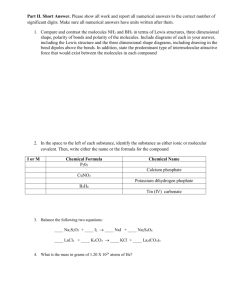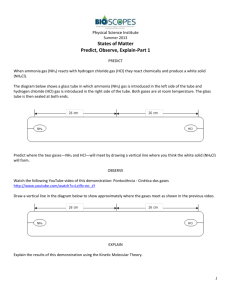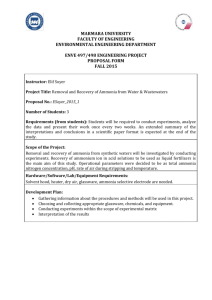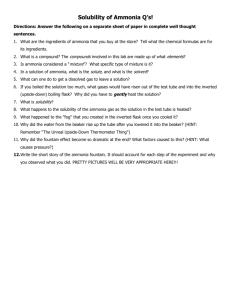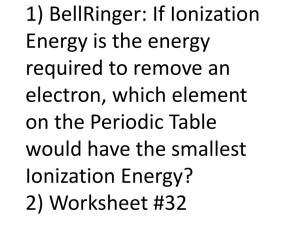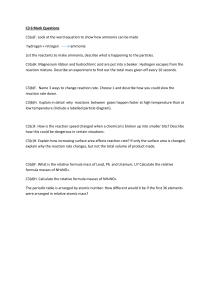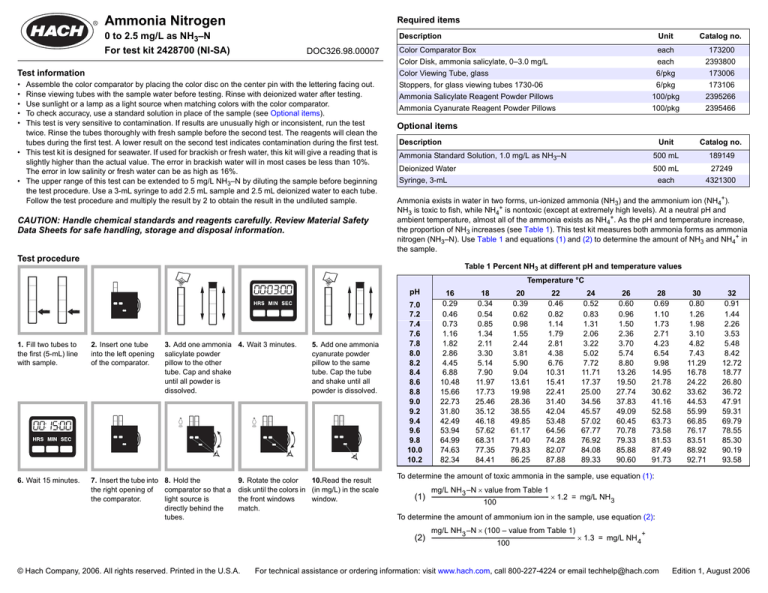
Ammonia Nitrogen
Required items
0 to 2.5 mg/L as NH3–N
Description
Unit
Color Comparator Box
each
173200
Color Disk, ammonia salicylate, 0–3.0 mg/L
each
2393800
Test information
Color Viewing Tube, glass
6/pkg
173006
•
•
•
•
•
Stoppers, for glass viewing tubes 1730-06
6/pkg
173106
For test kit 2428700 (NI-SA)
DOC326.98.00007
Assemble the color comparator by placing the color disc on the center pin with the lettering facing out.
Rinse viewing tubes with the sample water before testing. Rinse with deionized water after testing.
Use sunlight or a lamp as a light source when matching colors with the color comparator.
To check accuracy, use a standard solution in place of the sample (see Optional items).
This test is very sensitive to contamination. If results are unusually high or inconsistent, run the test
twice. Rinse the tubes thoroughly with fresh sample before the second test. The reagents will clean the
tubes during the first test. A lower result on the second test indicates contamination during the first test.
• This test kit is designed for seawater. If used for brackish or fresh water, this kit will give a reading that is
slightly higher than the actual value. The error in brackish water will in most cases be less than 10%.
The error in low salinity or fresh water can be as high as 16%.
• The upper range of this test can be extended to 5 mg/L NH3–N by diluting the sample before beginning
the test procedure. Use a 3-mL syringe to add 2.5 mL sample and 2.5 mL deionized water to each tube.
Follow the test procedure and multiply the result by 2 to obtain the result in the undiluted sample.
CAUTION: Handle chemical standards and reagents carefully. Review Material Safety
Data Sheets for safe handling, storage and disposal information.
Catalog no.
Ammonia Salicylate Reagent Powder Pillows
100/pkg
2395266
Ammonia Cyanurate Reagent Powder Pillows
100/pkg
2395466
Optional items
Description
Unit
Catalog no.
Ammonia Standard Solution, 1.0 mg/L as NH3–N
500 mL
189149
Deionized Water
500 mL
27249
each
4321300
Syringe, 3-mL
Ammonia exists in water in two forms, un-ionized ammonia (NH3) and the ammonium ion (NH4+).
NH3 is toxic to fish, while NH4+ is nontoxic (except at extremely high levels). At a neutral pH and
ambient temperature, almost all of the ammonia exists as NH4+. As the pH and temperature increase,
the proportion of NH3 increases (see Table 1). This test kit measures both ammonia forms as ammonia
nitrogen (NH3–N). Use Table 1 and equations (1) and (2) to determine the amount of NH3 and NH4+ in
the sample.
Test procedure
Table 1 Percent NH3 at different pH and temperature values
Temperature °C
pH
1. Fill two tubes to
the first (5-mL) line
with sample.
2. Insert one tube
into the left opening
of the comparator.
3. Add one ammonia 4. Wait 3 minutes.
salicylate powder
pillow to the other
tube. Cap and shake
until all powder is
dissolved.
6. Wait 15 minutes.
7. Insert the tube into 8. Hold the
the right opening of
comparator so that a
the comparator.
light source is
directly behind the
tubes.
5. Add one ammonia
cyanurate powder
pillow to the same
tube. Cap the tube
and shake until all
powder is dissolved.
9. Rotate the color
10.Read the result
disk until the colors in (in mg/L) in the scale
the front windows
window.
match.
7.0
7.2
7.4
7.6
7.8
8.0
8.2
8.4
8.6
8.8
9.0
9.2
9.4
9.6
9.8
10.0
10.2
16
0.29
0.46
0.73
1.16
1.82
2.86
4.45
6.88
10.48
15.66
22.73
31.80
42.49
53.94
64.99
74.63
82.34
18
0.34
0.54
0.85
1.34
2.11
3.30
5.14
7.90
11.97
17.73
25.46
35.12
46.18
57.62
68.31
77.35
84.41
20
0.39
0.62
0.98
1.55
2.44
3.81
5.90
9.04
13.61
19.98
28.36
38.55
49.85
61.17
71.40
79.83
86.25
22
0.46
0.82
1.14
1.79
2.81
4.38
6.76
10.31
15.41
22.41
31.40
42.04
53.48
64.56
74.28
82.07
87.88
24
0.52
0.83
1.31
2.06
3.22
5.02
7.72
11.71
17.37
25.00
34.56
45.57
57.02
67.77
76.92
84.08
89.33
26
0.60
0.96
1.50
2.36
3.70
5.74
8.80
13.26
19.50
27.74
37.83
49.09
60.45
70.78
79.33
85.88
90.60
28
0.69
1.10
1.73
2.71
4.23
6.54
9.98
14.95
21.78
30.62
41.16
52.58
63.73
73.58
81.53
87.49
91.73
30
0.80
1.26
1.98
3.10
4.82
7.43
11.29
16.78
24.22
33.62
44.53
55.99
66.85
76.17
83.51
88.92
92.71
32
0.91
1.44
2.26
3.53
5.48
8.42
12.72
18.77
26.80
36.72
47.91
59.31
69.79
78.55
85.30
90.19
93.58
To determine the amount of toxic ammonia in the sample, use equation (1):
mg/L NH –N × value from Table 1
3
- × 1.2 = mg/L NH 3
(1) ------------------------------------------------------------------------------------------
100
To determine the amount of ammonium ion in the sample, use equation (2):
mg/L NH –N × (100 – value from Table 1)
+
3
- × 1.3 = mg/L NH 4
(2) --------------------------------------------------------------------------------------------------------------
100
© Hach Company, 2006. All rights reserved. Printed in the U.S.A.
For technical assistance or ordering information: visit www.hach.com, call 800-227-4224 or email techhelp@hach.com
Edition 1, August 2006

